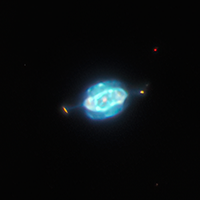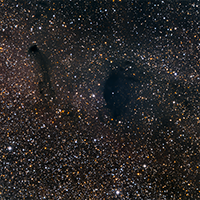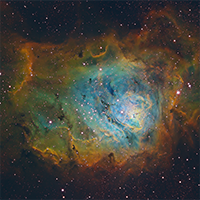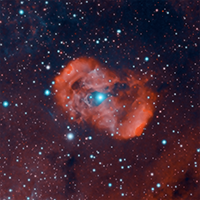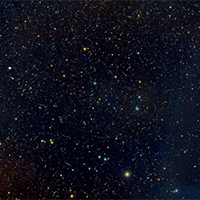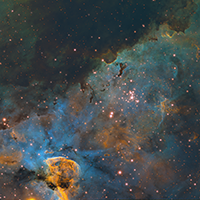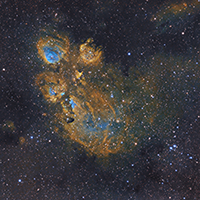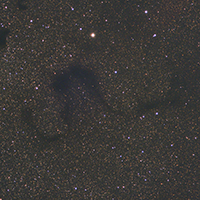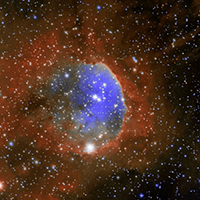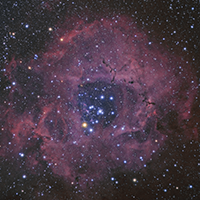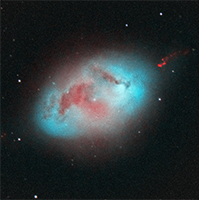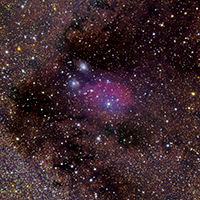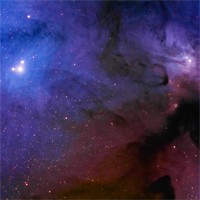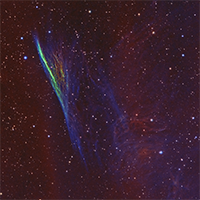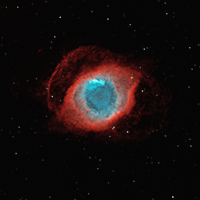Tagged: nebula
27-Sep-2020
The Saturn Nebula is a tiny but complex planetary nebula, ~4000 light years away in Aquarius. The Saturn Nebula gets its name from its resemblance to the planet Saturn to the observer.
04-Sep-2019
The dark molecular clouds of Barnard 92 (center) and 93 (left) are superimposed over the Messier 24 Sagittarius Star Cloud.
27-Aug-2019
The Lagoon Nebula is an active stellar nursery spanning 60 light years across. This false color photograph shows the interplay of three gasses: hydrogen-alpha in green, sulfur-II in red, and oxygen-III in blue.
02-Jul-2019
4200 light years distant, NGC 6164 is a bipolar emission nebula was created by a massive O-type star, 40 times as larger than the Sun.
23-Jun-2019
Shown in this animation is the movement of Ceres over 8 hours, on the night of 4th June 2019, as it passed by the outer edge of IC4592, the Blue Horsehead Nebula.
19-Apr-2019
One of the largest nebulae in the sky, the Carina Nebula is visible to the naked eye in the southern sky.
19-Jul-2018
Shaped like a cats paw, NGC 6334 is a stellar nursery and emission nebula 5,500 light years away in the constellation Scorpius. This image comprises of emission line data for Sulfur-II, Hydrogen-alpha and Oxygen-III, mapped to red, green, and blue respectively.
24-May-2018
The Snake Nebula (also known as Barnard 72) is a small but S-shaped dust lane that snakes out in front of the Milky Way star clouds.
13-Mar-2018
The Gabriela Mistral Nebula lies close to the Carina Nebula ~7500 light years distant in the far-southern sky. This image is a narrowband representation showing glowing ionised gasses, Hydrogen-alpha (orange), Sulfur-II (red), and Oxygen-III (blue).
21-Jan-2018
The Rosette Nebula is an emission nebula 3000 light years away. The central area of the nebula contains an open cluster of hot, blue stars which have cleared much of the center of its gas.
28-Nov-2017
NGC 1360 is known as the Robin's Egg Nebula, primarily due to its blue hue from strong oxygen-III emissions. It is a diffuse planetary nebula 1794 light years away. Presented is a narrowband image with H-alpha emissions mapped to red, and OIII emissions mapped to both green and blue (HOO palette).
17-Aug-2017
Sh2-37 is a hydrogen emission nebula with two small blue reflection nebulae, embedded in a dusty background against the core of the Milky Way.
27-Apr-2017
Inside the Rho Ophiuchi cloud complex live the star clusters IC4604 (left) and IC4603 (right). Heading towards the bottom of the image shows the transition from blue reflection nebulae to red emission nebulae. Interspersed are dark absorption nebulae, blocking the light from the stars behind them.
02-Feb-2017
NGC 2736, known as the Pencil Nebula is a part of the supernova remnants from the Vela pulsar, 815 light years away.
16-Aug-2016
I've already done the Helix Nebula in natural colour, so I've imaged it again in narrowband. Lots of H-alpha and Oxygen-III, but barely any Sulfur-II.
